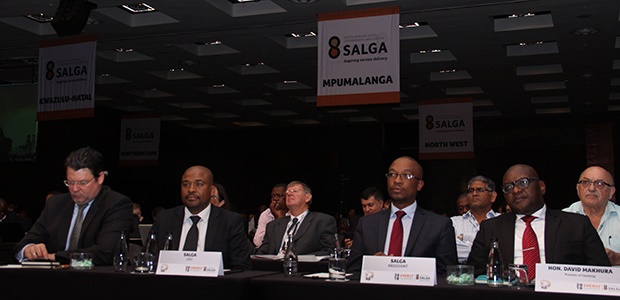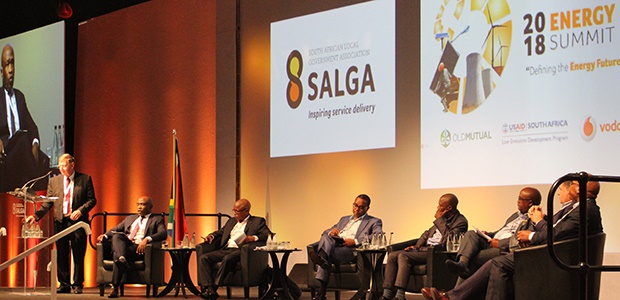Municipalities want a bigger role in the energy future. They want to be allowed to generate their own electricity and to purchase directly from independent power producers.
This was an overwhelming call from those that attended 2018 South African Local Government Association (SALGA) Energy Summit in Sandton last week. The summit brought under one roof, mayors, municipal managers, councillors, municipal officials and different players in the energy and non-governmental sectors under the theme: Defining the Energy Future of Local Government”.
Speaking during a roundtable discussion focusing on the main theme, Polokwane Mayor Thembi Nkadimeng said legislation and regulations were prohibiting municipalities from entering into their own power generation and power acquisition transactions. She said the Department of Energy was sitting with 14 applications from municipalities that want to be licensed to generate their own power or purchase directly from independent power producers closer to them.
Nkadimeng said her own municipality was extremely frustrated because it had spent R110 million providing electricity infrastructure to 24 villages within its jurisdiction but couldn’t recoup this money in full through tariffs because it is not licensed to generate or transmit electricity, but to only distribute and reticulate using a tariff structure that is controlled by Eksom.
“I have provided infrastructure but I cannot collect from those I have provided infrastructure to,” she said.
Xola Phakati, Mayor of the Buffalo City Municipality, said reliance on electricity generated by Eskom’s coal fired power stations that are concentrated in Mpumalanga and Limpopo was a massive disadvantage for municipalities such as his which have to pay more for that power to be transmitted thousands of kilometres.
“Our electricity is generated in Mpumalanga and transmitted to the Eastern Cape. We pay more for that, our geographical location is a disadvantage for us,” he said.
A proliferation of informal settlements within their jurisdiction also meant that they experienced a high number of illegal connections, resulting in massive losses for the municipality which still has to be pay Eskom for the electricity that is lost as a result.
“There has to be a balance because municipalities rely on electricity for revenue. Structural deficiencies and low growth means that they can’t meet their social obligations while accumulating debt to the generator, Eskom. How are we going to mitigate the effects of this stagnant growth in our economy?”
But Eskom board member Jackie Modisane insisted that there was a place for the state entity in the future energy transition. She said there were 6.4 million electrified households within Eskom’s mandate, most of them in rural areas. The utility was also faced with a R30 billion payment backlog from municipalities.
“The energy sector is undergoing change driven by global transformation opportunities and challenges. The way we produce, transmit and consume is changing. You can bring in others, but Eskom should be a player and not displaced,” she said.
Modisane said a case in point was the amount that Eksom charged for power. Whereas its rates were around 80c per KW, independent power producers were coming in at around R2.05c per KW, making Eskom’s power competitive. But that didn’t mean that there was no room for other players in the energy sector to participate, but this would depend on changes to regulations and the adaptation of a viable business model for all.
“Let us do private participation in a way that is inclusive, in a way that jobs are being created, localisation is happening and industries are created. Also, people must be skilled, the investment by the state should profit not just a few people but done in a responsible way. When we bring in the private sector, let us not discard Eskom, we can actually co-exist. Eskom has a role to play.”
SALGA President Parks Tau said the organisation had been negotiating with national government over many years on the issue of municipalities generating and reticulating their own electricity and had even suggested that a declaratory order be sought through the courts to enable this to happen. He said national government had asked for all avenues to be explored before resorting to the courts. But SALGA was now ready for the courts to become final arbiter on the matter.
“The SALGA NEC (National Executive Committee) has resolved that maybe it’s time we go for a declaratory order so we can get the courts adjudicating on matters that are in dispute,” he said.
On the energy future and whether Eskom had a role to play, Tau said the best method was to look at the developmental interests of the country from generation, transmission and distribution to determine which would be the best suited model for economic growth and participation.
“We have Eskom; it has powerplants, a balance sheet, personnel (and) bonds that we should be worried about. How do we resolve the problem? We must start with everything and say where does Eskom fit into the puzzle.”
Gauteng MEC for Infrastructure Development Jacob Mamabolo called for the introduction of a completely new energy regime. He said worries being raised that the introduction of private players and allowing municipalities and individuals to generate their own power would destroy Eskom were unfounded.
“How will it do that? It’s precisely because of this fear that we are unable to move as a country. I’m of the view that it won’t. It’s in the best interests of Eskom to review its operating model so that it can be efficient while sustainable.
“Communities can establish solar farms and sell (excess energy) back to the grid, generating their own revenue,” said Mamabolo.


